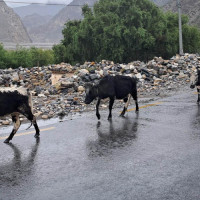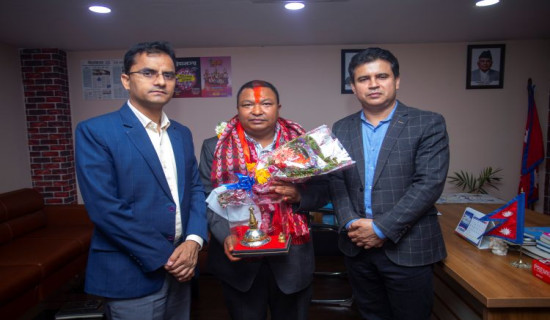- Monday, 26 May 2025
Behind the scenes of pani puri stalls
BY AAJ JYOTI Kathmandu, July 19: In Gwarko, Patan, a community of five families work day and night to cook puri. The puris they make are sold to pani puri stalls, which are pushed around the city of Kathmandu.
In every family in this community, the husband goes to work in the morning, and the children go to a nearby school. The husbands have varied jobs, such as labourers and fruit sellers.
When the rest of the family are away, the wives knead and store the dough needed to make the puri. After the family reassembles in the evening, the frying process begins.
The children flatten and shape the dough, then stack and pull apart the dough, which is followed by heating the oil. The fathers ensure the dough has been prepared sufficiently and then fry the cut-out pieces.
Santosh Musahar is a brick loader living in this community. He moved to Nepal from Bihar, India, with his wife. They now live in a corrugated metal shed, in a plot of rented land. This land is shared with four other families, who all live in similar sheds. The land also consists of several other sheds, used solely for the cooking process. The dough is prepared, flattened and shaped in bedrooms.
Musahar has three children, with the eldest being four and the youngest two. During the day, Musahar goes to his other job, as a labourer, to load bricks into trucks. At this time, when the children are at school, his wife prepares the dough to shape and fry.
Chandrikha Tatma, originally from Sitamarhi, India, believes the hardest part of the process is the kneading of dough. She kneads the dough in batches of 5kg, and wraps them in plastic sacks to keep them malleable until they are shaped.
She has a son who studies in Grade 7, who said the most difficult part in his opinion is purchasing the ingredients and transporting the products. They mix semolina and all-purpose flour with water to create the dough, which is then kneaded for a few minutes. Oftentimes, they are sold expired bags of flour, which then hinders their production.
The community has around 20 children, from babbling toddlers to teenagers. All eligible children are enrolled in school and have been taught by their parents the importance of education. Even though they get homework from school, they are well-skilled in the puri making procedures as they help their parents whenever possible.
Every day, each family makes around 10kg of dough in preparation. They sell Rs. 2,000 worth daily, with a 25 per cent profit. Without the help of the entire family, they are unable to satisfy the market demand. They sell singular bags for Rs.500. They buy litres of oil in bags, and use them until they turn into murky colour. They then sell the used oil, which is repurposed into bars of soap and statues.
Their business is influenced by the weather, and rainy days means there are less people outside. This affects how many bags of puris are bought from this community. Lately, the frequent rainfall paired with the banning of pani puri carts has greatly affected their demand.














